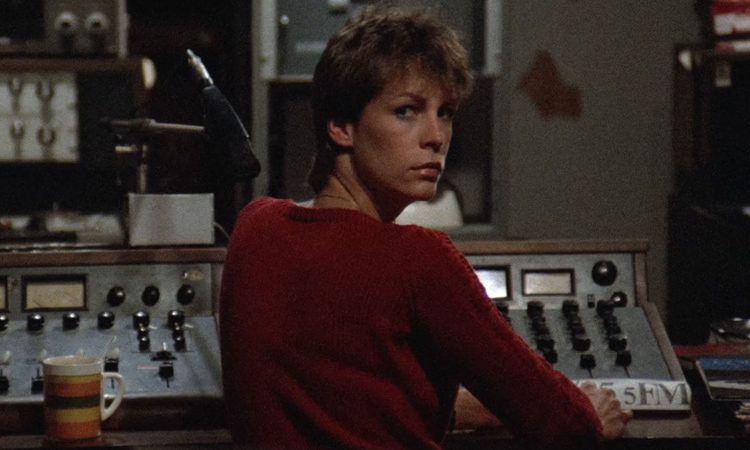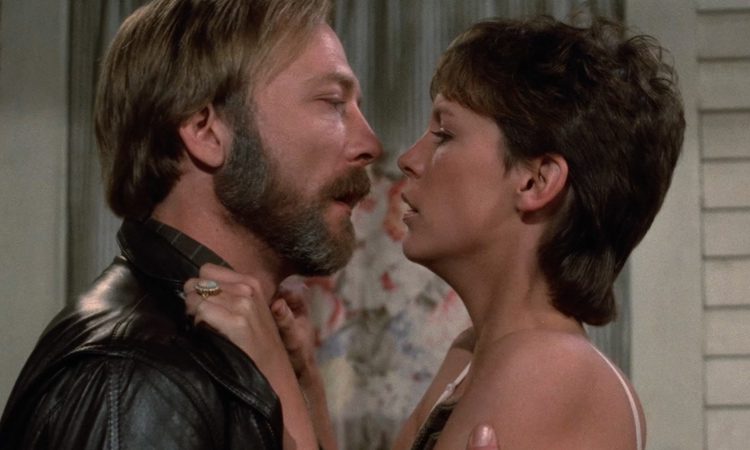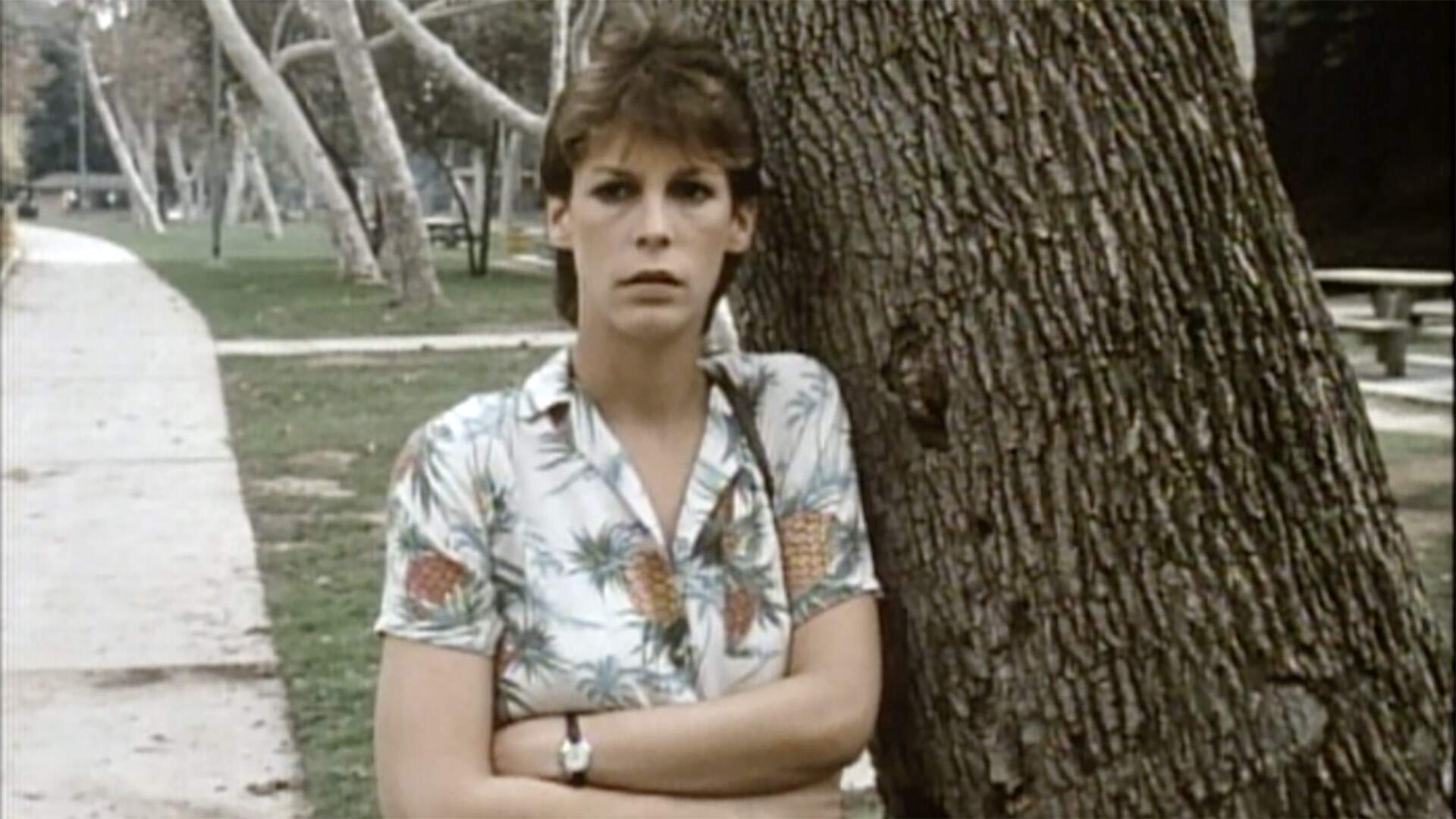We know so little of our parent’s lives before we are born. Reduced to just parents, we often forget that they have complex interior lives removed from us. To say nothing of the complex psychological web of contradictory emotions that form between us and them.
Amy Holden Jones’s Love Letters is a fascinating, emotional, and intelligent movie about a story we’ve seen a thousand times before; only the perspective has changed. The story of an extramarital affair, only from the lens of the “other woman.” Jones, who wrote and directed Love Letters as a follow-up to her debut Slumber Party Massacre, crafts a story about obsession and yearning without ever condemning anyone because it assumes that the audience is at least as intelligent as the people making the film.

Anna Winter (Jamie Lee Curtis) is a local public radio station DJ. Her mother, Maggie (Bonnie Bartlett), has just died. Grieving the loss of her mother, Anna discovers a stack of love letters from an affair she had when Anna was younger. Having recently broken up with her boyfriend, Anna seems adrift and wondering if she will ever find the love she sees in the movies- now found in her mother’s old love letters.
But far from being simply a love story, Jones imbues Love Letters with rich, dark, and subtle undertones. Anna’s relationship with her father, Chuck (Matt Clark), is strained, to say the least. Early on, Jones shows us how cold and distant the relationship between Maggie and Chuck is, starkly contrasting the feelings Anna discovers in her letters.
Far from enraged, Anna is compelled. The relationship between her mother and father made so much sense; he wasn’t the love of her life. Yet, Jones hints at something more. The way Anna cringes at her father’s closeness and how her father seems incapable of being emotionally open except when he’s drunk, and even then, it comes off as almost obsessive. “You’re so beautiful. Just like your mother.”
Enter Oliver (James Keach), a wealthy-married-photographer. Anna is instantly smitten with him, despite the wedding ring, or maybe because of it. He’s forty, and she’s twenty-two, and while the sex might be great, both have drastically different versions of what love is. But Jones never lets the film stray to Oliver’s sympathies; it’s squarely in Anna’s corner in that this is her story.
Notice how Jones and her cinematographer, Alec Hirschfeld, frame the sex scene. The camera is focused on Anna, with James largely off-camera. Sweaty and lost in hedonistic abandon, Curtis throws herself into the scene as Jones and Hirschfeld’s lens Anna’s pleasure. The nudity throughout the film is a mandate from the producer, Roger Corman, claiming he needed something to sell the movie. Jones abides by this, but the nudity, far from exploitative, comes off as frank and realistic, as if Hirschfeld’s camera had captured the lovers in an intimate moment. The only real issue is that Keach is not equally as nude, but that has more to do with the fascist MPAA rather than Jones or Corman.

Curtis captivates Anna – strong, independent, and yet vulnerable in ways she may not be aware of. Jones’s script allows Anna to feel fleshed out; in Curtis’s hands, you can feel the ocean of conflict underneath the surface—the desperation for clarity and the intoxicating high of being desired. All this is written on Curtis’ face as she navigates her troubled emotions.
Love Letters moves like a European film, less concerned with plot and typical emotional outbursts. Jones is working on a tight budget, but it only forces her to focus on what counts: Anna’s yearning for a love she only thought was possible in the movies. The story wanes and ebbs as Anna’s love for James slowly evolves into an obsession where she’s convinced she’s the right choice. Who could have foreseen this except everyone who was over the age of twenty-five?
It’s hard to feel for Keach’s Oliver. He should and does know better. He’s like Chris Sarandon in Flashdance, where you watch and wonder what they were expecting when they got involved with a younger girl. Anna is twenty-two – a year of being technically recognized by an adult – but anyone who has made it through their early twenties knows all too well how not an adult you are.
Anna watches From Here to Eternity with her best friend, Wendy (Amy Madigan), as they gush about wanting what they have. Her quest for this love so blinds her that she doesn’t even realize how it jeopardizes her career. She gets a job offer from a more stable and better-financed radio station in San Francisco, which she’s always wanted to work for, but passes it up for Oliver. Instead, she recommends a fellow DJ, Danny (Bud Cort).
Underneath everything are the love letters themselves. We hear the voice of the man Maggie loves, Joseph Chelsey (Rance Howard), as Anna desperately tries to capture and re-create the passion she discovers in an attempt to feel close to her mother, if only for an instant. Love Letters is about an affair and about a young woman losing her mother and how the latter can leave you utterly unmoored.
Jones and Hirschfeld’s camera occasionally dips into the stylized, crystalizing an emotion or the mood in a way that takes the breath away. The most infamous is the scene in which we see nothing but a white background, the sounds of Anna and Oliver’s lovemaking off-screen. Soon, we hear a mechanical sound followed by something flapping, and finally, a polaroid of Anna is thrown onto the screen and followed by another, and another, as Oliver gives her direction.
Oliver, he’s trying to capture something. Anna is trying to find something.

Predictably, Anna begins wanting more from her affair and even begins conflating hers with the experience between Joseph and her mother. She even tries maneuvering and manipulating conversations to make Oliver sound like the letters. Witness the scene where she confronts Oliver about wanting him to leave his wife. “I want you to love me and hate her!”
She even wrote a letter to Oliver, copying phrases and sentences from the letters. Anna is enraged when he doesn’t respond. Oliver rightly tells her, “I was confused. That letter didn’t sound anything like you.”
Soon, Anna forces the conflict and wakes up in Oliver’s house for the first time, in his son’s bed. Hirschfeld’s camera focuses on the child’s toy planes hanging from the ceiling. The toys are lined against the wall. Anna feels like she’s entered another world, and in a way, she has. But to her horror, it doesn’t feel how she thought it would. There’s another layer: Anna waking up in a child’s room facing Oliver’s children exposes how much of his life she’s not a part of and a reminder of how she’s not that far removed from them.
Jones relies too heavily on Chopin and Bach for the soundtrack, adding a treacly feeling that the rest of the film tries so hard to avoid. It’s a shame because Ralph James’s sparse score works well, acting as gear shifts as Love Letters slyly shift tones. The soundtrack feels oddly offkey for a movie, with everything else firing on all cylinders.
The secret sauce of Love Letters is Wendy Greene Bricmont’s editing. Jones herself started as an editor and likely had some hand in the film’s brisk but concise cuts, but either way, the film’s structure makes it inherently compelling. Especially the way Bricmont cuts in flashbacks into the present day, symbolizing Anna’s forlorn attempt to make sense of her parents’ marriage and her love life.
More than anything, what makes Love Letters linger is the thorny and challenging darkness that percolates under the film’s surface. Unlike many Hollywood films, Jones leaves you alone and never tells you what to think. Of course, the relationship between Oliver and Anna is wrong, and if you need Jones to say so, then perhaps you shouldn’t be watching movies.
Anna reminds me of that Willam H. Macy line from Magnolia: “I have love. I just don’t know where to put it.” She’s a woman who yearns to be yearned for but can’t quite figure out that the feeling she’s craving is the prelude to love, not love itself. It’s impossible not to watch Anna and not have your heart break for her because this is a woman who has lost her mother, arguably never had a father—all she wants simply and honestly to be loved.
The finale of Love Letters is simple yet complicated. Anna has a dream about a night she walked in on her parent’s arguing. The pieces come together, leaving us to guess, but for Anna to understand. Few movies would feel comfortable leaving situations unresolved, which makes Love Letters so captivating. It’s uninterested in the big explosive moments we’ve seen a hundred times. Instead, it shows the small human moments of a woman coming into her own, even if she stumbles along the way.
Images courtesy of New World Pictures
Have strong thoughts about this piece you need to share? Or maybe there’s something else on your mind you’re wanting to talk about with fellow Fandomentals? Head on over to our Community server to join in the conversation!

